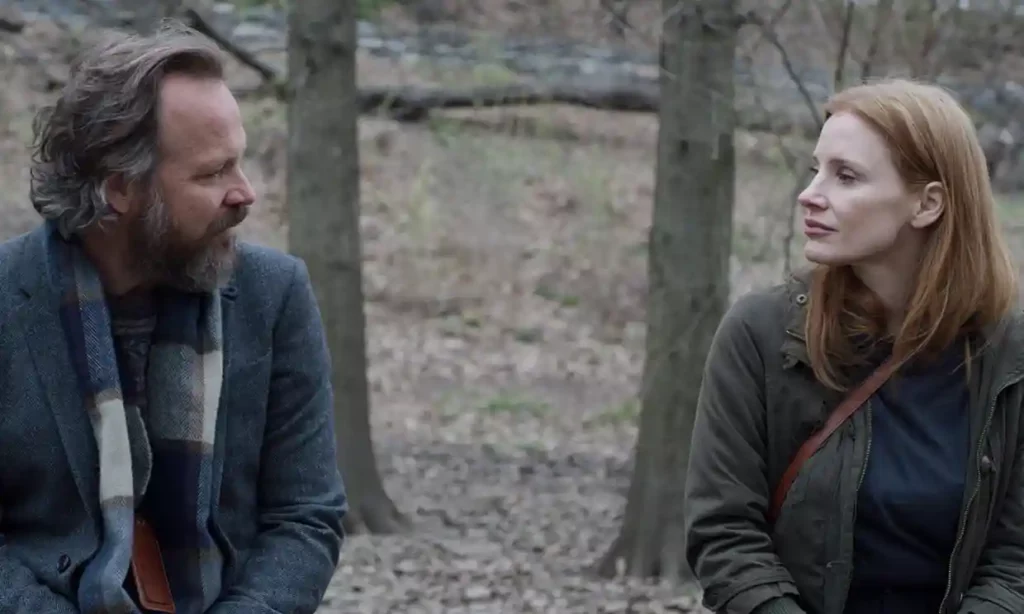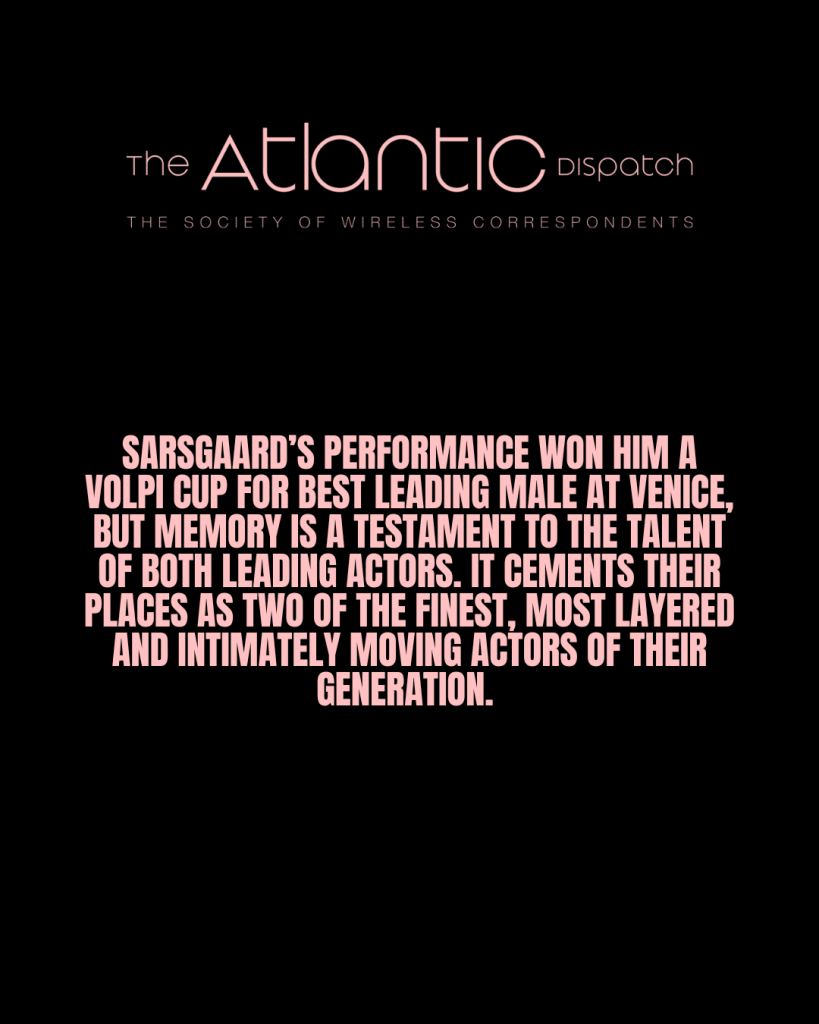How do we reconcile trauma with the unreliable building blocks that are our memories? So asks Mexican director, screenwriter and producer Michel Franco (Sundown, New Order, After Lucia) in his latest work, Memory. It premiered at last year’s Venice Film Festival, where it was nominated for the Golden Lion Award for best picture. It is arguably Franco’s most poignant and heartfelt achievement to date.
Sylvia (Jessica Chastain) is a social worker and recovering alcoholic of 13 years – the same age as her teenage daughter Anna (Brooke Timber), with whom she lives in her small but cosy Brooklyn apartment. Their life together is simple, bound by routine. With all the enthusiasm of someone all too used to leaving the past behind, Sylvia attends her high school reunion. We watch on as she visibly regrets her decision and the festivities happen around her. Her early exit delivers the unsettling entrance of Saul (Peter Sarsgaard) who, after shooting an empty smile at her table before she leaves, follows her to the station. Then on the subway. Then to her apartment.
Saul is suffering from early-onset dementia. According to his uppity brother Isaac (Josh Charles) with whom Saul lives, their encounter was just another of his latest episodes. Shaken and confused, Sylvia’s memory of Saul takes her to a dark place in her teenage years. But when Isaac lucratively proposes that Sylvia take care of Saul as his carer, their dynamic changes. It’s this foundation from which both Sylvia and Saul (whose condition maintains those most distant of memories) attempt to reconcile their pasts with their present realities.
What transpires is a heart-wrenching and soul-searching exploration of what it means to remember. Both Sylvia and Saul are uniquely complex. We see early on that Sylvia’s life is defined by both her sobriety and her deep mistrust of men in particular. Her AA meetings are the one constant by which she can set her watch; she specifically asks for a repairwoman to fix her dishwasher; her door is bolted with a paranoia-inducing number of locks. With the exception of her conceited sister, her family are oddly absent.
Saul’s life is also about routine: sticking to that which he knows to be true. His brother is overprotective, overseeing Saul’s credit cards and leaving obviously placed notes on the front door reminding him to not venture outside.
Both characters display a sad fact of life: that unresolved trauma cannot be relatable. It is acutely individualistic. But Sylvia and Saul demonstrate, over the course of the film, that reconciliation can be found in life’s most relatable quality: that of genuine human connection. Their body language, emotional openness and sexual intimacy become qualifiers of trust, and Chastain and Sarsgaard do a phenomenal job of forging it.
Sarsgaard’s performance won him a Volpi Cup for best leading male at Venice, but Memory is a testament to the talent of both leading actors. It cements their places as two of the finest, most layered and intimately moving actors of their generation.
With Earth-shattering clarity, Memory cycles through the weightiest subject matter possible: sexual assault, addiction, alcoholism, dementia. Yet despite the delicacy of the narrative, this is a film that gets out of the way and lets the characters develop at their own pace. At first, this is unnerving: the newfound unpredictability that is introduced after Sylvia and Saul’s chance encounter becomes the only thing upon which the audience can (at least initially) rely. The precariousness of their lives begins to mirror the direction of the film itself.
Those familiar with Franco’s varied filmography could be forgiven for viewing the film through the lens of revenge – a theme into which he has previously leaned, with devastating success. But those inclinations are shattered early on, and what emerges is a plot devoid of cliche or certainty. Scenes are often stitched together in a patchwork of occurrences; sometimes they are cut before fully allowing the viewer to get settled, and others linger on the intensity of a moment for longer than you might expect. Franco’s masterful game of give and take here only intensifies the viewing experience: moments of dread land harder; sequences of joy deliver greater warmth; seconds of silence linger deafeningly.
Flipping otherwise everyday moments into tools of tension is perhaps Franco’s greatest achievement in this film. Routine encounters like the whizzing-by of a subway train or a walk through the woods are framed to create a sense of anxiety: to emphasise that the world happens around Sylvia and Saul and that in order to participate in it they must each shake the trauma that follows them so closely. Even mundane background noise – like knives and forks on a plate or the hum of the coffee machine – is at a noticeably elevated volume, suffocating what would be otherwise regular sequences.
This new addition to the evergreen collection of Michel Franco confirms his status as a master in direction and storytelling. Franco’s stunning range (compare this to say, New Order) was reportedly one of the main attractions for both Chastain and Sarsgaard. It’s also true that Chastain recommended Sarsgaard to play the character of Saul from the outset. The trio complement one another with total synergy.
This is a gripping story of finding peace through the act of survival, that doesn’t let up until the very last moment. It is portrayed with supreme intelligence and deftly captured with breathtaking nuance.


MEMORY is in UK and Irish cinemas from 23rd February memoryfilm.uk
